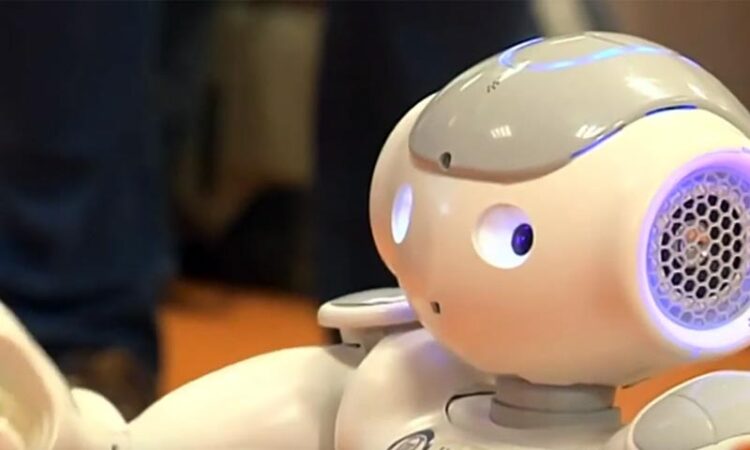Robotics and artificial intelligence to improve health rehabilitation

Credit: UC3M
A Universidad Carlos III de Madrid (UC3M) spin-off, Inrobics Social Robotics, S.L.L., has developed a robotic device that provides an innovative motor and cognitive rehabilitation service that can be used at health centres as well as at home. Inrobics was created using research results from the University’s Department of Computer Science and Engineering.
The entrepreneurial team has developed a platform made up of four elements: a robot that interacts with the patient, an artificial intelligence system that uses a 3D sensor to control the robot, an application that can be used by health care staff to set up and track sessions, and a cloud-based storage system which contains information and analytics from all of the rehabilitation processes. “The 3D sensor allows us to know the patient’s position at all times.
For example, we know if they are raising their arm, but we also know if they turn their spine to compensate for difficulty when doing so. All of this information is compiled and entered into the clinical reports that are generated,” says Fernando Fernández, professor at the UC3M’s Department of Computer Science and Engineering and founding partner of Inrobics.
The objective is to improve rehabilitation therapies using imitation-based activities and a series of exercises, as well as provide additional tools for health care staff to optimise these sessions. “For example, for patients like children, interacting with a robot is like playing with a toy. They never think they are going to the hospital for rehabilitation, they think they are going to play. This is the added value that we offer. On the other hand, we are also able to enrich the therapist’s working situation, as they often lack tools adapted to specific patient’s profiles,” says José Carlos Pulido, founding CEO of Inrobics.
In addition to this, the platform, which has been designed by paediatric professionals (cognitive and functional diversity) along with geriatric professionals (active ageing and accompaniment), can also be used at home as a remote rehabilitation resource to improve family balance and quality of life.
The Spanish National Hospital for Paraplegics (Toledo) is the first centre to conduct a clinical trial using these artificial intelligence tools, which have been used with paediatric patients.with spinal cord injuries.
Media Contact
Fco. Javier Alonso
Universidad Carlos III de Madrid
oic@uc3m.es
Office: 916249035
All latest news from the category: Information Technology
Here you can find a summary of innovations in the fields of information and data processing and up-to-date developments on IT equipment and hardware.
This area covers topics such as IT services, IT architectures, IT management and telecommunications.
Newest articles

First-of-its-kind study uses remote sensing to monitor plastic debris in rivers and lakes
Remote sensing creates a cost-effective solution to monitoring plastic pollution. A first-of-its-kind study from researchers at the University of Minnesota Twin Cities shows how remote sensing can help monitor and…

Laser-based artificial neuron mimics nerve cell functions at lightning speed
With a processing speed a billion times faster than nature, chip-based laser neuron could help advance AI tasks such as pattern recognition and sequence prediction. Researchers have developed a laser-based…

Optimising the processing of plastic waste
Just one look in the yellow bin reveals a colourful jumble of different types of plastic. However, the purer and more uniform plastic waste is, the easier it is to…



